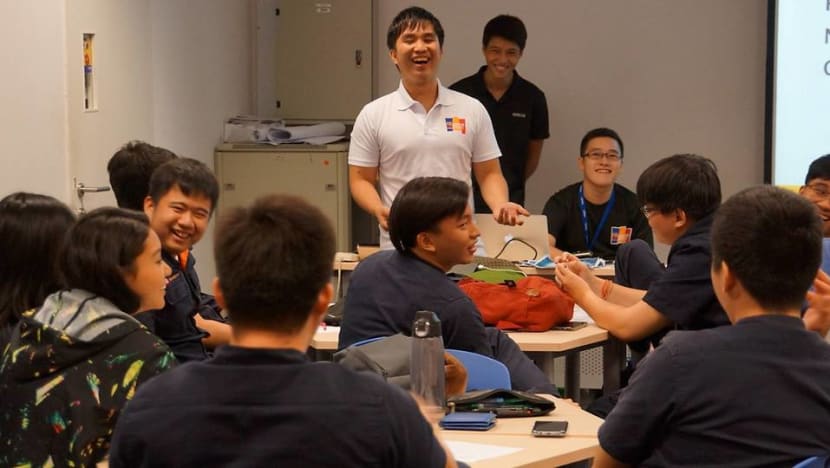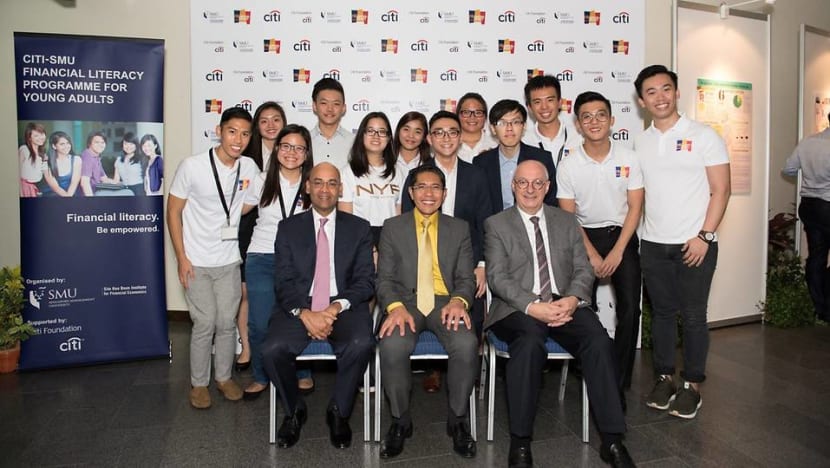commentary Singapore
Commentary: Millennials need a stronger grasp of personal finances
Schools have a part to play in equipping young people with financial literacy skills, says one Citi-SMU financial literacy student trainer.

Student trainers from SMU and ITE conduct a peer-to-peer workshop on money management, investment and insurance. (Photo: SMU)
SINGAPORE: The financial picture millennials face today is vastly different from that of their parents.
With higher life expectancies, a higher cost of living and greater market volatility, the stakes are higher when it comes to the kinds of financial decisions a young adult has to make today compared to 50 years ago.
No doubt many would have picked up rudimentary knowledge about budgeting, saving and spending from their parents.
However, to make educated financial decisions about investing money and saving for the future, more in-depth knowledge is clearly required.
TIMELY FOR SCHOOLS TO PICK UP THE PACE
Financial literacy starts at home, but for a generation where past advice on personal finances don’t neatly apply to our experiences, a more deliberate effort is needed to equip young adults with relevant knowledge and skills.
With the advent of fintech, cryptocurrency and as societies embrace cashless payments, ours is a complex world with more financial opportunities but greater uncertainty.
Where education should prepare our youths for the practical challenges of modern life, it seems schools should play a bigger role in helping students understand money matters, alongside teaching traditional education curriculum.
So Finance Minister Heng Swee Keat’s announcement at Budget 2018 that a new financial education curriculum will be piloted at polytechnics and the Institute of Technical Education (ITE) colleges is a timely move.
A STRUCTURED PROGRAMME
Developing financial capability among young adults can help uncover blind spots and inform savings, investment and insurance decisions that contribute to one’s longer-term financial well-being.
In an effort to raise the level of financial literacy of young adults, Citi Singapore and Singapore Management University (SMU) launched the Citi-SMU Financial Literacy Programme for Young Adults in April 2012 with the support of the Citi Foundation.
It is Singapore’s first structured financial literacy programme for young adults, a brainchild of Jeremy Goh, an Associate Professor of Finance at SMU.
Through lectures, workshops and course curriculum, the programme seeks to equip young adults between the ages of 17 and 30 with essential personal finance knowledge and skills applicable to their life stage to give them a firm foundation in managing their money and a financial head-start early in their lives.

The programme utilises a unique peer-to-peer training model in which selected students from SMU, polytechnics and ITEs are trained by SMU faculty members, industry practitioners and government agencies including CPF Board and HDB to be financial literacy coaches.
They in turn, with the Citi-SMU programme team, conduct interactive workshops and creative initiatives including games, carnivals, camps and competitions to engage young adults from the ITE Colleges, polytechnics and community organisations including the Association of Muslim Professionals and the Chinese Development Assistance Council.
Since its launch, close to 210 SMU students and more than 120 students from five polytechnics and three ITE colleges have been trained as financial literacy coaches.
The programme has also engaged over 18,000 young adults on a wide range of topics including basic money and credit management, financial and retirement planning, home and car ownership as well as principles of investment.
From an introduction to the CPF system, to understanding of housing and healthcare insurance, the programme has provided them with an insight into the very issues they will find themselves concerned soon – saving to buy a house and starting a family.
Apart from high outreach, an impact assessment on 700 participants conducted by Assistant Professor Aurobindo Ghosh from SMU’s Lee Kong Chian School of Business and Principal Investigator (Research) of the programme demonstrates the efficacy of the programme.
60 per cent of participants said they improved their basic understanding of financial literacy concepts. 86 per cent strongly agreed on the need to start a regular savings plan compared to 66 per cent before attending the programme.
40 per cent said they have also been able to develop and use a simple personal budget to manage their expenditure and increase their savings by at least 10 per cent.
Furthermore, the programme saw a 20 per cent increase in the number of students who said they were now investing more prudently.

It seems trainers who have graduated from the programme are generally more confident in managing their money, follow prudent investment strategies with their savings, and share knowledge with their peers. Many become leaders in advocating financial awareness among their peers.
If this model is to be scaled up, the hope is that it reaches more young adults – and delivers not just an understanding near-term issues like how much to save for your Built-to-Order flat but also a stronger grasp of longer-term challenges that youths tend to discount, including what makes for sufficient retirement adequacy.
EDUCATION IS KEY
Financial literacy is a critical life skill today.
Greater focus should be placed on teaching young adults how to plan their finances for their unique situations and aspirations.
More can also be done to motivate them to apply these newly acquired skills to take action. There is a gap between knowing what to do and doing the right thing. The closing of this gap is the next stage in the financial literacy movement, to progress from financial literacy to financial capability.
Where the goal is to give millennials the confidence in their financial future, a financial education curriculum may be the key.
Ultimately, it’s up to millennials to figure out modern life and how to live within their means, but they can be given a leg up if armed with a basic understanding of the mechanics of personal financing.
Vivian Quark Zhi Xian is a student trainer in the Citi-SMU Financial Literacy Programme for Young Adults.














